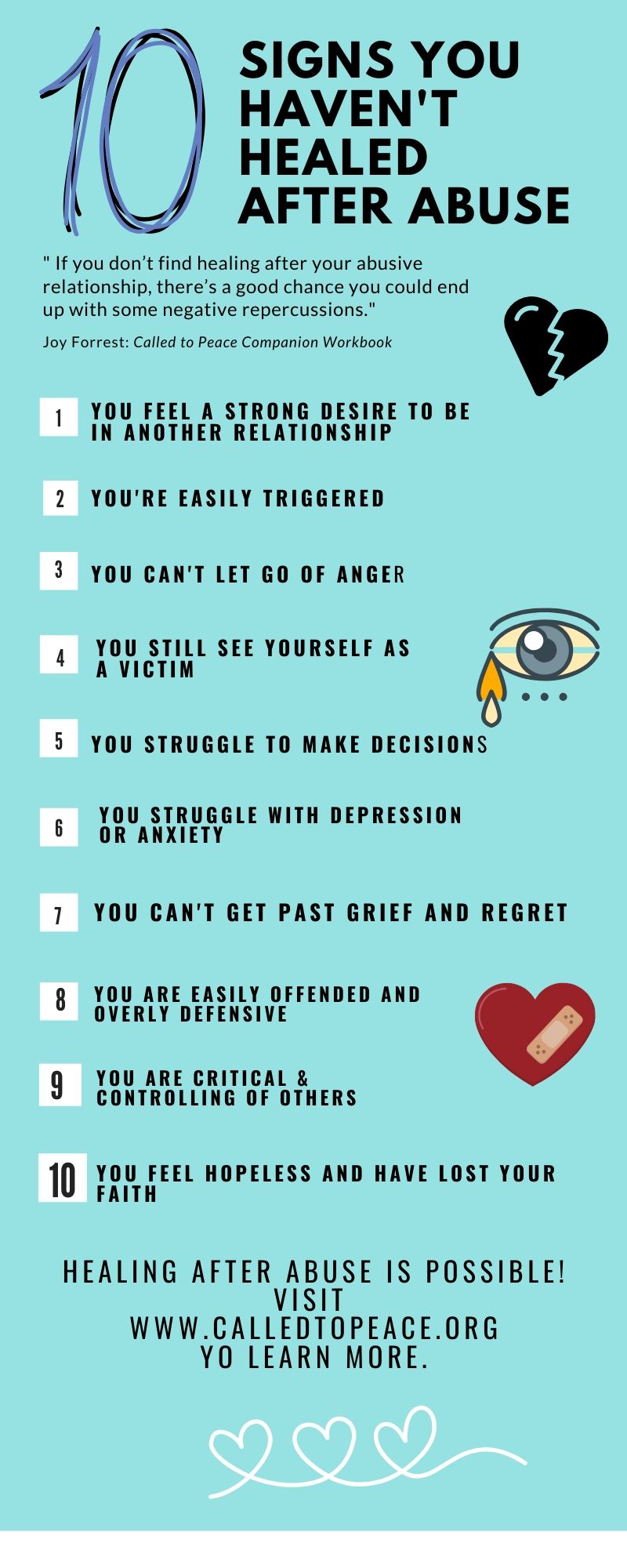Ten Signs You Haven’t Healed After Domestic Abuse
I lived 23 years of my life as a victim. Well no, that’s not exactly true. I left my abusive husband after 23 years, but my victim status didn’t go away until several years after that. Becoming a victim was not my choice, and it was never my fault, but eventually I learned that moving out of the victim mindset was my responsibility. In the years after I got out of the abuse, my misery and God’s providence graciously led me to truths that enabled me to overcome and move from victim to victor. It was not a quick or easy process, but it was an amazing time that I wouldn’t trade for anything. God lifted me out of a pit despair and taught me how to walk in complete dependence on him in the midst of incredible turmoil. He grounded me in truth and made me a better person than I ever was before the abuse.
Even as I was working through my own healing process, I began working with victims of domestic abuse. I still had so much to learn, but I was willing to share the truths God was teaching me. In the beginning it was really hard for me to hear survivor’s stories without experiencing strong feelings of outrage and anger. I am sure that my support during those early years was iffy at times, but nothing could stop me from pursuing my passion to help. Over the past 23 years of doing this work I have learned many valuable lessons from hundreds of survivors. One of the hardest lessons has been seeing what happens to victims of abuse who never take the time to heal, or try to fast track the process by skipping the hard work it usually takes. Here’s what I’ve come to believe:
There’s no subtle way to say it. If you don’t find healing after your abusive relationship, there’s a good chance you could end up with some negative repercussions. You may find yourself moving on to another abusive relationship. You could end up suffering from severe depression or anxiety, or worst of all, you might find yourself chronically angry, perhaps even abusive yourself. *
I can’t tell you how many times I’ve seen these outcomes. I’ve seen scores and scores of women move from one abusive relationship to another, because they were still operating out of trauma from previous relationships, and because they never became healthy enough to recognize what to look for in a new relationship. The hardest part of overcoming abuse is overcoming the warped thinking that comes with it. I often tell people that it took a lot longer to get the abuse out of me than it did for me to get out of the abuse (and getting out wasn’t easy or quick). I had come to believe so many lies, which were aggravated by the physical impacts of post traumatic stress. These lies were so deep-seated in me that took years to recognize and replace them with truth. Meditation on His Word was powerful, but even after attaining the major healing milestone of forgiving my ex husband, I had a long way to go. Forgiveness did help alleviate the anger that almost destroyed me, but it did not stop the fear and anxiety that continued to rule me. Healing was a process that required honest self- appraisal along with sheer determination not to allow lies to control me any longer.
Where are you in the healing process? Have you determined to work through the impacts of abuse, or are you too afraid to face the truth of what happened? Sadly, that response is the quickest way to stay stuck or end up repeating destructive patterns. Many times people start the work towards recovery, but then try to skip over important steps like forgiveness, grief or self-examination. Are you willing to take an honest look at yourself? If so, below are some signs you have still some work to do.
Ten signs that you’re stuck in the trauma of your past.

- You feel a strong desire or need to be in another relationship— or maybe even back in the destructive one you left. You may find yourself longing for your abuser. You may have no idea of what a healthy relationship looks like, but that doesn’t stop you from trying again.
- You still see yourself as a victim. While you were victimized by someone, allowing it to become your identity is very dangerous. You may find yourself unable to trust even those who have good intentions towards you, and assume their motives are evil even when they are not.
- You find yourself easily triggered by anything that reminds you of the abuse you experienced. A sound, smell or even a word can thrust you into a state of panic or dissociation.
- You struggle with depression or anxiety. While there are chemical and hormone imbalances that can contribute to these conditions, it’s important to recognize that trauma also changes brain chemistry. Recovery work with a trauma informed counselor, and meditating on truths to counter warped thinking, can help rewire the brain so that it may be possible to overcome long term depression and anxiety.
- You can’t move past the anger. Anger, in and of itself, is not wrong. We are made in God’s image, and there are things that anger him. The problem comes when we become consumed with anger and are unable to let it go. Anger like this becomes destructive, and compels us to want to control things rather than releasing control to God. It is self-focused versus righteous anger which is God-focused.
- You are easily offended and overly defensive. When we haven’t healed we tend to take things too personally. We often read into the motives of others and make faulty assumptions based on our past experience rather than reality. This can cause problems in most of our relationships.
- You are critical and controlling of others. Part of healing after abuse involves learning to let go the need to control things that are beyond our control, particularly other people. When we become hyper aware of others’ faults and feel it’s our job to correct them, we are in danger of treating others the way our abusers’ treated us.
- You struggle to make decisions. When we’ve been controlled and criticized for years, it is hard to move forward and feel confident about our choices. Most of us were told we couldn’t do anything right, so the simple act of making a decision can become paralyzing.
- You can’t get past grief and regret. There’s hardly anything more traumatic than being maliciously betrayed by someone we love. It’s hard to get over the shock that their intentions were so evil, especially when we loved them so much. Many times we struggle to get past the guilt and regret we have for failing to recognize the abuse sooner. Grief is a normal part of the healing process that we can’t avoid, but it becomes a problem when it turns to self-pity.
- You feel hopeless and have lost your faith. Living with abuse can make us feel like our abusers are even more powerful than God. It’s especially difficult when they use scripture as a weapon to convince us that God is on their side. Nearly every victim of abuse I’ve ever met found their faith was damaged in some way, and most struggle with hopelessness at some point.
Has abuse left you angry, fearful or distrusting of people in general? Do you find yourself having difficulty with relationships in general? Are you easily offended or do you assume evil motives on the part of people who are truly trying to help you? Are you stuck in regret over the past? If so, you are not alone. These are normal responses to trauma and betrayal. The abuse was not your fault, but finding healing after abuse is your responsibility. Are you willing to do an honest self- appraisal and determine to do the work it takes to heal?** If not, you will miss out of the hope and healing our God offers. My prayer for you today is that you will encounter His life-changing truth, and that He will give you the grace and wisdom needed to walk the path to freedom. 💗
*Forrest, Joy, Called to Peace Companion Workbook, Blue Ink Press, p. 141.
**If you don’t know where to begin your healing process, Called to Peace Ministries’ offers a scripture based curriculum and support groups that can help. Visit calledtopeace.flywheelstaging.com to learn more.
